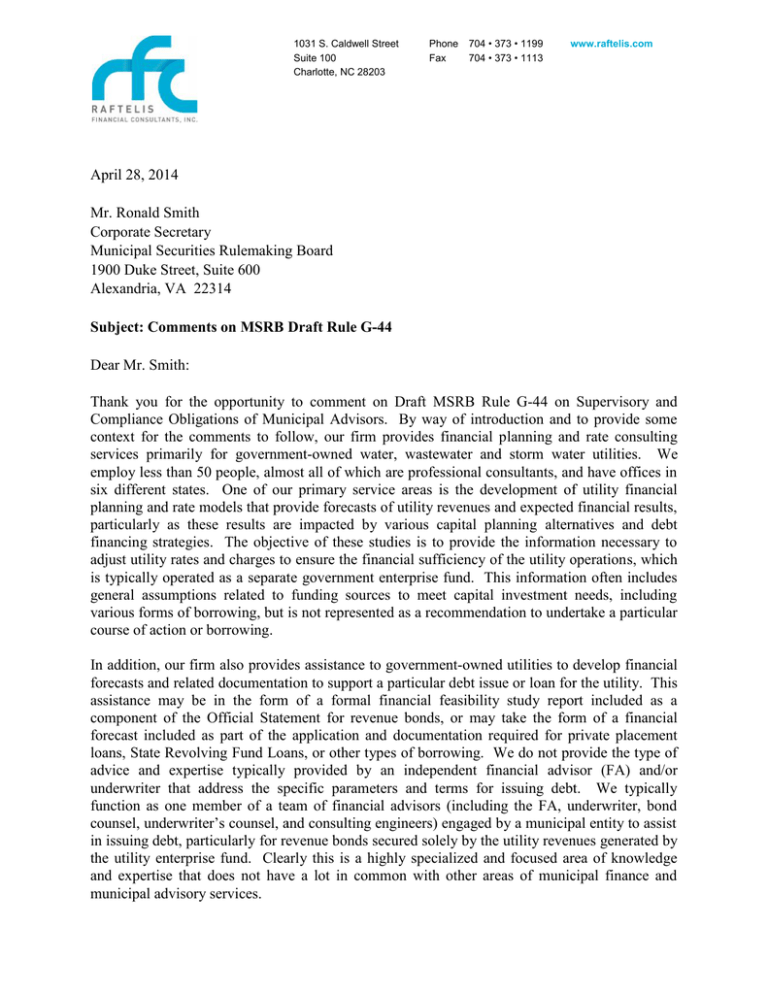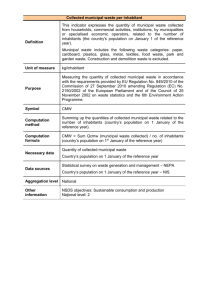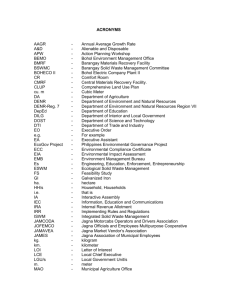1031 S. Caldwell Street Phone 704 • 373 • 1199 Suite 100
advertisement

1031 S. Caldwell Street Suite 100 Charlotte, NC 28203 Phone Fax 704 • 373 • 1199 704 • 373 • 1113 www.raftelis.com April 28, 2014 Mr. Ronald Smith Corporate Secretary Municipal Securities Rulemaking Board 1900 Duke Street, Suite 600 Alexandria, VA 22314 Subject: Comments on MSRB Draft Rule G-44 Dear Mr. Smith: Thank you for the opportunity to comment on Draft MSRB Rule G-44 on Supervisory and Compliance Obligations of Municipal Advisors. By way of introduction and to provide some context for the comments to follow, our firm provides financial planning and rate consulting services primarily for government-owned water, wastewater and storm water utilities. We employ less than 50 people, almost all of which are professional consultants, and have offices in six different states. One of our primary service areas is the development of utility financial planning and rate models that provide forecasts of utility revenues and expected financial results, particularly as these results are impacted by various capital planning alternatives and debt financing strategies. The objective of these studies is to provide the information necessary to adjust utility rates and charges to ensure the financial sufficiency of the utility operations, which is typically operated as a separate government enterprise fund. This information often includes general assumptions related to funding sources to meet capital investment needs, including various forms of borrowing, but is not represented as a recommendation to undertake a particular course of action or borrowing. In addition, our firm also provides assistance to government-owned utilities to develop financial forecasts and related documentation to support a particular debt issue or loan for the utility. This assistance may be in the form of a formal financial feasibility study report included as a component of the Official Statement for revenue bonds, or may take the form of a financial forecast included as part of the application and documentation required for private placement loans, State Revolving Fund Loans, or other types of borrowing. We do not provide the type of advice and expertise typically provided by an independent financial advisor (FA) and/or underwriter that address the specific parameters and terms for issuing debt. We typically function as one member of a team of financial advisors (including the FA, underwriter, bond counsel, underwriter’s counsel, and consulting engineers) engaged by a municipal entity to assist in issuing debt, particularly for revenue bonds secured solely by the utility revenues generated by the utility enterprise fund. Clearly this is a highly specialized and focused area of knowledge and expertise that does not have a lot in common with other areas of municipal finance and municipal advisory services. Mr. Ronald Smith Municipal Securities Rulemaking Board April 28, 2014 Page 2 In our opinion, this distinction between general rate and financial planning studies, and studies and assistance related to a specific bond issue or loan (debt issuance support), is significant and important in the context of how the regulations related to municipal advisory services may be applied to our firm. Our interpretation of the proposed regulations for municipal advisors is that only those studies or assistance related to a specific debt issue or loan falls within the definition of municipal advisory activities and constitutes the provision of “advice” to municipal clients, as the term “advice” is defined in the Final Rule adopted by the SEC amending Section 15B of the Securities Exchange Act. To this end, our firm was registered as a Municipal Advisor as soon as the first guidelines were made public. In contrast, we would argue that financial planning and rate studies that are generated to facilitate the utility rate setting process and the evaluation of capital planning alternatives, and that are not associated with a plan or course of action to enter into a specific loan or debt issue, do not constitute municipal advisory activities and advice, as defined in the Final Rule. However, we are waiting on additional guidance and information from the MSRB to determine if our interpretation of the Final Rules and other related rules and regulations is valid and acceptable. The final interpretation of whether all of these activities are judged to fall within the definition of municipal advisory services, or only those debt issuance support services associated with a specific loan or debt issue, will have a significant impact on our firm and the level of effort and costs associated with maintaining compliance with the proposed rules governing Municipal Advisors. Needless to say, the burden placed on our firm to address regulatory compliance requirements, including additional overhead and management costs incurred, will be passed to our clients in the form of increased fees and costs. Given the nature of our consulting practice, and the importance we have always placed on providing high quality products and services for our clients, and the assumption we have always maintained of a fiduciary duty and a duty of care and loyalty to our clients, our firm has, of necessity, maintained high levels of supervision and oversight on all engagements. We maintain high levels of involvement by senior personnel, who possess substantial experience and expertise, on all of our engagements, and particularly those involving debt issuance support services. However, in the absence of government oversight and regulatory compliance requirements, it has not been necessary to develop and maintain written records of supervisory and compliance policies and procedures. Draft Rule G-44 requires that we now develop written supervisory procedures that are “reasonably designed to ensure that the conduct of the municipal advisory activities of the municipal advisor and its associated persons are in compliance with applicable rules”. As currently stated, this language is insufficient. How are we to know if the written policies and procedures drafted to address the applicable rules are reasonable and sufficient? Will the MSRB provide samples of written procedures and rules to provide a guide for addressing this requirement? Who is responsible for determining if the written policies and procedures that are developed are adequate? Will they be reviewed by someone at the MSRB and approved? Although it is clear that draft Rule G-44 provides some flexibility to tailor these written procedures and policies to address specific characteristics of our firm (including size, number of offices, and types of services provided), the lack of guidance on what these written policies need Mr. Ronald Smith Municipal Securities Rulemaking Board April 28, 2014 Page 3 to address serves to increase the burden and cost of compliance. How are we to know, and how is the MSRB to know, if all firms that provide comparable services are maintaining comparable written procedures and policies? What mechanisms are available to ensure that other specialized firms that may address other types of specialized municipal financing issues will maintain comparable levels of compliance? The requirement to maintain written supervisory policies and procedures seems to require a level of effort and cost that does not provide a commensurate level of benefit to the clients that we serve. Similar comments and concerns are raised by the requirement for conducting a periodic review and update of the written policies and procedures for supervision and regulatory compliance. Also, it is not clear when these written policies and procedures will need to be in place. Will the final version of Rule G-44 provide a specific deadline for when written policies and procedures need to be in place? The requirement to designate one or more municipal advisory principals and one individual as a chief compliance officer to be responsible for providing appropriate levels of supervision for municipal advisory services raises other concerns, particularly for smaller firms and sole proprietor firms. In our case, if the majority of the services we provide are determined to fall within the definition of municipal advisory services, this will impact the number of principals needed to be designated as responsible for supervisory functions. If only those services that we define as debt issuance support fall into this category, then compliance with supervisory requirements (not to mention the disclosure requirements proposed in draft Rule G-42) becomes much more manageable and cost effective. How large does a firm have to be, or how large does a municipal advisory practice area have to be, before it is necessary to designate additional principals as having supervisory roles? Again, the draft Rule G-44, as currently written, does not provide adequate guidance for smaller firms that provide a limited and specialized set of services that fall under the municipal advisor definition, to be able to effectively and efficiently address the requirements of Rule G-44. Responses to specific questions listed in MSRB Regulatory Notice 2014-04 1) Although it seems unlikely that a more prescriptive approach would be helpful or advantageous to municipal entities, the current principles-base approach is made less effective due to the ambiguous nature of the language and lack of applicable and useful guidance on how compliance may be achieved by firms who are trying to develop written policies and procedures for the first time. Given the broad nature of the types of services and types of firms that may be impacted by these rules, it will be extremely difficult to provide reasonable guidance that covers all situations. The impact of these rules is likely to be a reduction in the number of firms providing certain kinds of municipal advisory services, particularly in more specialized areas of municipal activities. This will make it harder for municipal entities to procure the advice and expertise they need to make informed decisions, and may serve to increase the level of risk associated with borrowing money to address capital needs. Given the magnitude of these capital needs, particularly in the water and sewer industry, any policy that increases the difficulty, cost and risk associated with borrowing money, can only be considered as counter-productive. Mr. Ronald Smith Municipal Securities Rulemaking Board April 28, 2014 Page 4 2) See comments to question 1. 3) Yes, this ability may be essential for fairly small firms to be able to address these requirements. 4) It is not possible to address this question at this time given that the development of professional certification standards is currently the least well defined and articulated of the compliance requirements proposed for Municipal Advisors. 5) In spite of the comments provided above, it would seem that some form of rules and regulations related to supervision and compliance obligations will be necessary, and advantageous. However, the requirement to maintain written records of supervisory and compliance policies and procedures may be unnecessary, may not provide any additional benefits, and may be overly burdensome and costly. 6) No comment. 7) Almost certainly. 8) As noted above, as currently written, it is very difficult to determine the extent of the impact and additional costs that might be incurred to achieve compliance with the various rules affecting municipal advisory services. However, we believe these rules will add at least 5 percent to the cost of providing debt issuance support services for our clients, while providing little benefit to the client in terms of an improved product or to the public (and lenders) in terms of reduced risk. 9) As noted above, and with respect to the specific services provided by our firm and other similar firms that serve the water and wastewater utility industry and whose role as a Municipal Advisor is fairly limited, the benefits will be small. This must be weighed against the risk that certain information and services relied upon by government-owned utilities to facilitate the process of borrowing money may become more expensive and less readily available. 10) No comment. 11) Some distinction needs to be made between those Municipal Advisors that provide assistance and advice to address a broader range of municipal borrowing functions and municipal advisory services, and those that are focused on more specialized and narrowly focused forms of assistance. However, since there are likely to be a significant number of exceptions and special types of municipal advisory assistance provided within the broader field of municipal borrowing and finance, developing a comprehensive and fair set of rules will be problematic, at best. One possible way to carve out some specialized areas of assistance might be to recognize different rules or standards of enforcement for services addressing debt incurred by separate enterprise funds with independent revenue sources to service that debt. 12) If there is any effect, it will be to limit the number of firms that are available to provide assistance to Municipal Entities, particularly for debt issues associated with particular enterprise funds and specific industries. 13) See comments above. Mr. Ronald Smith Municipal Securities Rulemaking Board April 28, 2014 Page 5 Again, we appreciate the opportunity to provide comments to the MSRB as you develop the rules and regulation affecting Municipal Advisors. We understand that our comments and concerns are very specific and address how the proposed rules and regulation may affect our business and our ability to continue to provide certain services to our clients, and that these services are highly specialized for a particular industry. If we can be of assistance in providing further information about the services we provide to government-owned water and sewer utilities, please do not hesitate to contact me. We have also shared our comments with another firm that is affiliated with ours and provides similar services as an independent sole proprietor, Woodcock and Associates. Mr. Woodcock is also registered as a Municipal Advisor and has reviewed and supports the comments we have provided and is added as a signatory to this letter. Sincerely, RAFTELIS FINANCIAL CONSULTANTS, INC. Alexis F. Warmath Vice President WOODCOCK & ASSOCIATES, INC. Christopher P.N. Woodcock President




